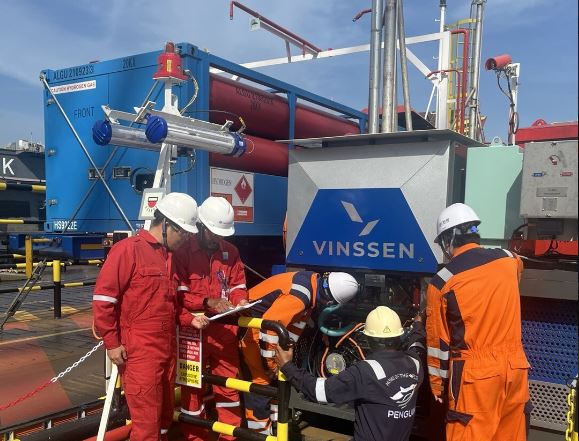VINSSEN, a specialist in maritime decarbonization technology, has made significant strides in demonstrating the feasibility of hydrogen fuel cell systems for commercial vessels.
The company’s recent success in passing Bureau Veritas (BV) performance tests for its 60kW Proton Exchange Membrane (PEM) Fuel Cell System marks a notable achievement in the maritime hydrogen sector.
VINSSEN’s 60kW PEM Fuel Cell System, which includes a Fuel Cell Module (FCM), an integrated converter module, a battery system, and a transformer, was subjected to rigorous performance tests by BV. These tests are crucial for validating the reliability and efficiency of hydrogen fuel cells under real-world maritime conditions. The successful completion of these tests indicates that VINSSEN’s technology is viable for integration into commercial vessels, offering a potential pathway to reducing maritime carbon emissions.
Seok-Hee LEE, VINSSEN’s Project Manager, acknowledged the challenges faced during the project, emphasizing the importance of systematic problem-solving and collaboration with project partners. This approach underscores the complexity of deploying new technologies in maritime applications, where reliability and safety are paramount.
VINSSEN’s progress must be evaluated against the backdrop of global efforts to decarbonize the maritime industry. Hydrogen fuel cells are increasingly seen as a promising solution for reducing greenhouse gas emissions from shipping. However, the industry faces several challenges, including high production costs, infrastructure development, and regulatory hurdles.
VINSSEN’s Approval in Principle (AIP) Certification from the Korean Register (KR) for its 250kW and 100kW Maritime Fuel Cell Power Packs further strengthens its position in the market. These certifications are critical for gaining industry acceptance and facilitating the adoption of hydrogen technologies.
Additionally, VINSSEN’s Type Approval for a 92kWh Lithium-Ion Battery System and the successful delivery of Korea’s first fully battery electric passenger ferry, “Garden Dream,” highlight the company’s broader commitment to maritime decarbonization.
VINSSEN’s recent Series C investment round, which raised 15 billion KRW, demonstrates strong investor confidence in the company’s technology and market potential. The funds are earmarked for product development, market expansion, and recruitment of key personnel, indicating a strategic focus on scaling operations and enhancing technical capabilities.
The establishment of a US branch office in Seattle and participation in the K-Startup Center in Singapore illustrate VINSSEN’s international ambitions. These moves are critical for accessing new markets and forming strategic partnerships, particularly in regions with strong regulatory support for clean energy technologies.
The ongoing trial project in Singapore, conducted in collaboration with Shell Singapore Pte. Ltd., Seatrium Limited, Penguin International Limited, and Air Liquide Singapore Pte. Ltd., exemplifies the collaborative nature of advancing hydrogen technologies. Such partnerships are essential for pooling expertise, sharing risks, and accelerating the commercialization of hydrogen fuel cells.
While VINSSEN’s achievements are noteworthy, the company must navigate several challenges to maintain its momentum. The high cost of hydrogen production, the need for robust refueling infrastructure, and regulatory uncertainties are significant hurdles that require continuous innovation and strategic planning.
